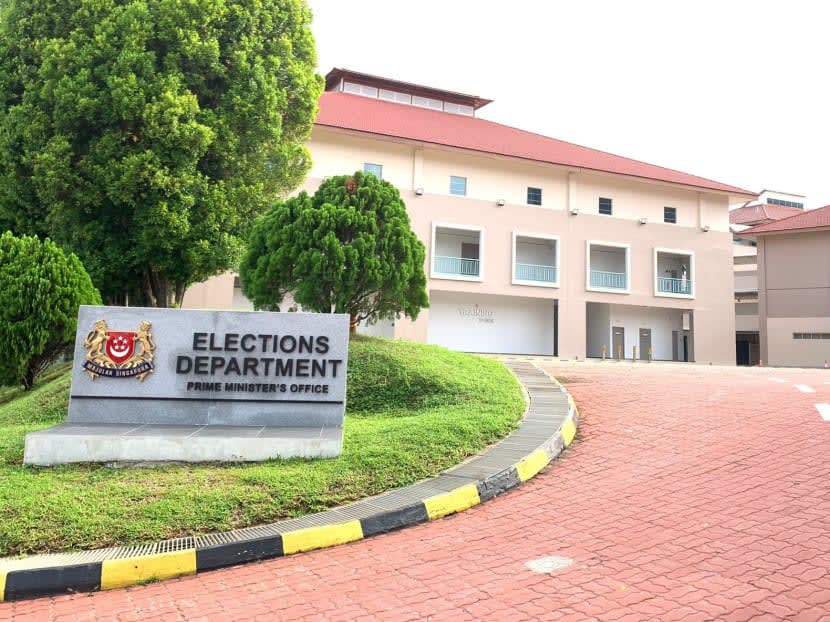ELD unveils measures to enhance voting security, secrecy for overseas S'poreans, nursing home residents

- To ensure voting secrecy and security for overseas Singaporeans, ELD will incorporate a unique QR code on each overseas voter’s return envelope
- This is to ensure only one ballot paper from each voter will be counted
- ELD will also use technology to verify the signature on the envelope against the signature submitted during the initial registration
- For voters in nursing homes, portable lap booths will be provided for bed-to-bed polling to ensure voting secrecy
SINGAPORE — In response to feedback, the Elections Department (ELD) on Tuesday (July 26) announced measures to better ensure voting secrecy and security for overseas Singaporeans when they are casting their ballots.
ELD said that it will incorporate a unique Quick Response (QR) code on each overseas voter’s return envelope to ensure only one ballot paper from each voter will be counted. It will also use technology to verify the wet-ink signature on the envelope against the signature submitted during the registration of overseas voters.
Overseas voters will be required to log in via the Singpass authentification system to the ELD Voter Services website, in order to validate their identity and download the return envelope and postal ballot paper, ELD said in a press release.
It added that the QR code will not contain any personal information or identifiers, and only envelopes with valid QR code will be accepted.
This technology has not been widely adopted in other countries. Estonia is one of the few that has done so. There, a QR code appears once an online vote is registered, which the voter can scan with their smartphone to confirm that their vote was registered correctly.
The measures were in response to feedback received during an exercise conducted by ELD over the introduction of special voting arrangements for people residing overseas as well as those living in nursing homes.
The feedback exercise involved 13 political parties and 39 nursing home operators. ELD also received close to 3,300 responses from overseas Singaporeans living in 64 countries and members of the public.
More than four in five, or 82 per cent, of the 3,221 overseas respondents expressed support for the initiative, with convenience and being able to exercise the right to vote while living overseas as the top two reasons given for their support.
Of the 1,771 respondents who had never voted while living overseas, a similar proportion, 83 per cent, also indicated their willingness to take part in postal voting.
However, overseas Singaporeans had raised concerns about the security and secrecy of the ballot, transparency of the process, as well as the ease and cost of postal voting.
In response, ELD said that it will spell out the criteria for the rejection of return envelopes to ensure transparency.
These include damaged or unsealed envelopes, multiple envelopes with the same QR code received from one individual, if the signature on the envelope does not match the specimen signature, and envelopes containing more than one postal ballot paper.
ELD will also provide information on overseas voters, as well as an update to postal voters on whether their return envelopes were received, after the counting of overseas votes.
The department added that it will provide postage-paid return envelopes for overseas postal voters, where this is available, to avoid delays that may happen due to insufficient postage.
“Postal voters can start downloading and self-printing both their postal ballot paper and return envelope starting from the day after Nomination Day.
“The marked portal ballot papers must be posted before Polling Day in Singapore and reach ELD no later than 10 days after Polling Day. This will provide postal voters with sufficient time to mark the postal ballot papers and mail back to ELD in time to be counted,” it said.
ARRANGEMENTS AT NURSING HOMES
ELD said that stakeholders were “generally supportive” of the move to pilot special voting arrangements at nursing homes.
However, they were concerned about voting secrecy, how to ascertain whether nursing home residents have the mental capacity to vote, as well as operational and resource matters regarding setting up on-site polling stations and administering bed-to-bed polling.
In response to the issue of voting secrecy, ELD said that a portable lap booth will be provided for bed-to-bed polling, so that voters can mark their ballot papers in private shielded by the front and sides of the booth.
“To address the concern that voters may be influenced by the nursing home staff during voting, ELD will provide clear guidelines on what nursing home staff can and cannot do.”
For instance, nursing home employees may help a voter to sit up at his bed in preparation for the bed-to-bed polling but will be required to move away when the person is ready to vote.
They are also not allowed to mark the ballot paper on behalf of a voter or “engage in any actions that may influence a voter when he marks the ballot paper”, ELD said.
In the event that voters are physically unable to mark the ballot paper, they may ask an election official to help them, while a second election official witnesses the process as a safeguard.
These measures are similar to those undertaken at a regular polling station.
For people who may lack the mental capacity to vote, ELD said that it will follow the same approach already adopted at regular polling stations
For example, voters will not be issued a ballot paper if they do not respond to the election official’s repeated requests for their identification document and poll card.
“Taking into consideration feedback from key stakeholders that the profile of the residents across nursing homes can vary widely in terms of their physical and mental health, ELD will engage the nursing home operators further to better understand the profile of nursing homes before finalising the parameters and selection criteria for the pilot,” it added.











